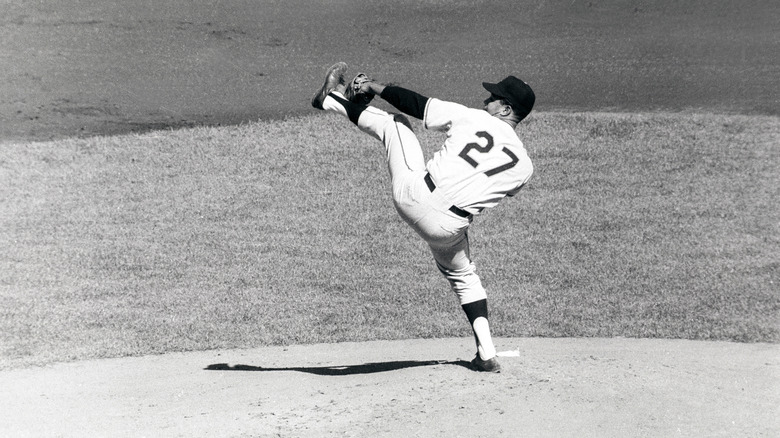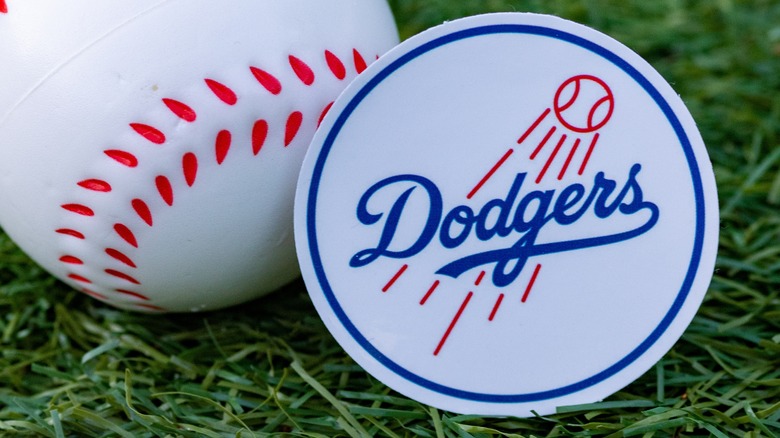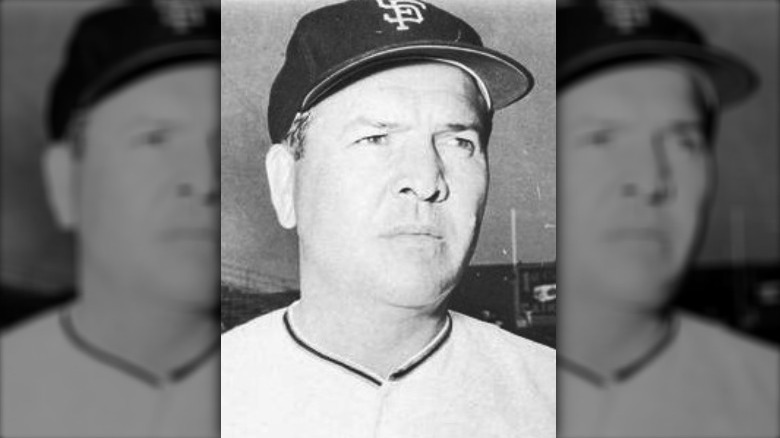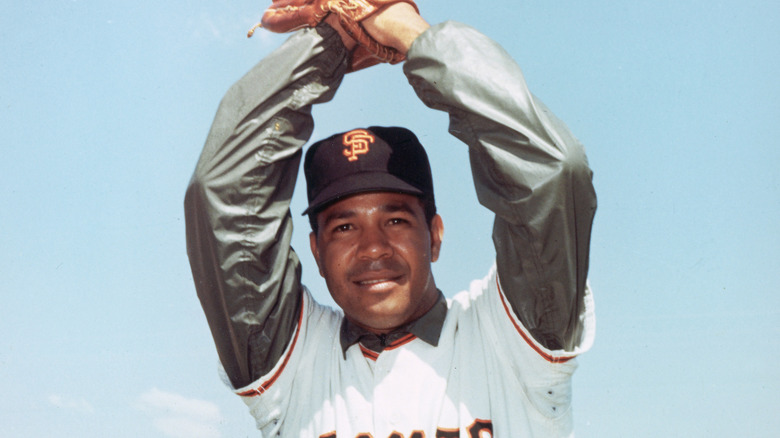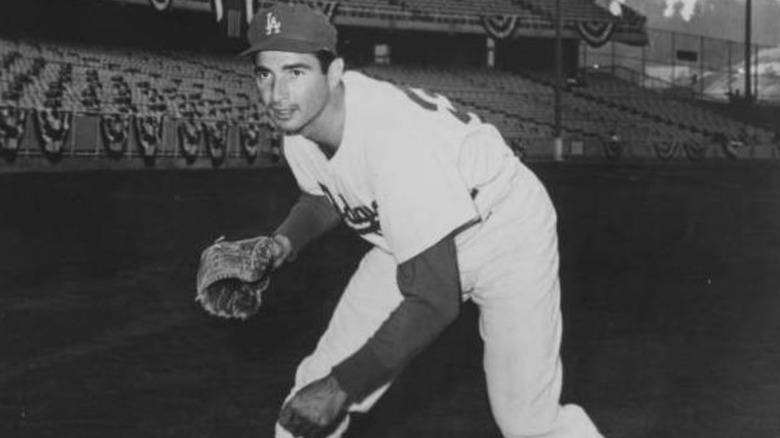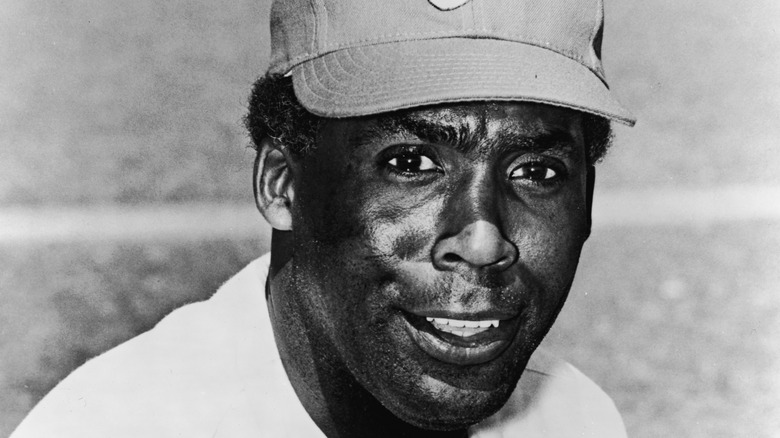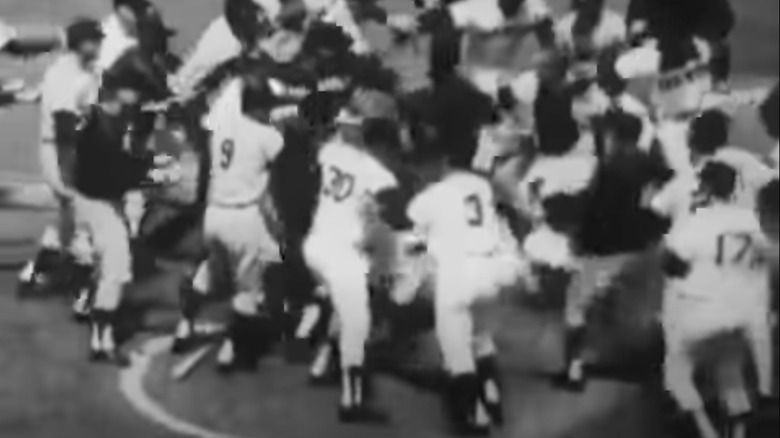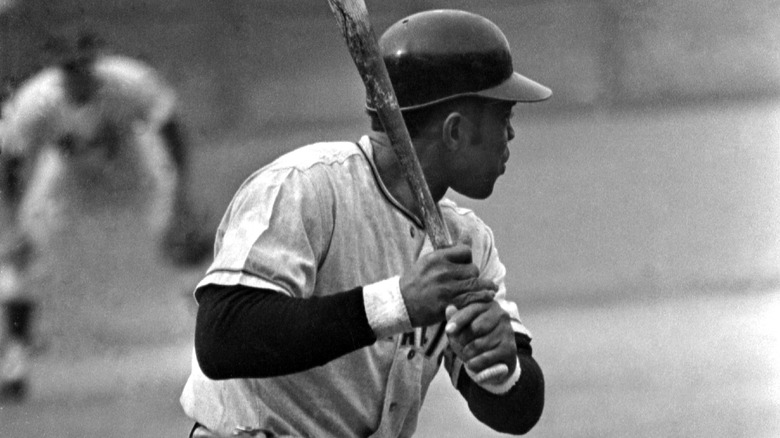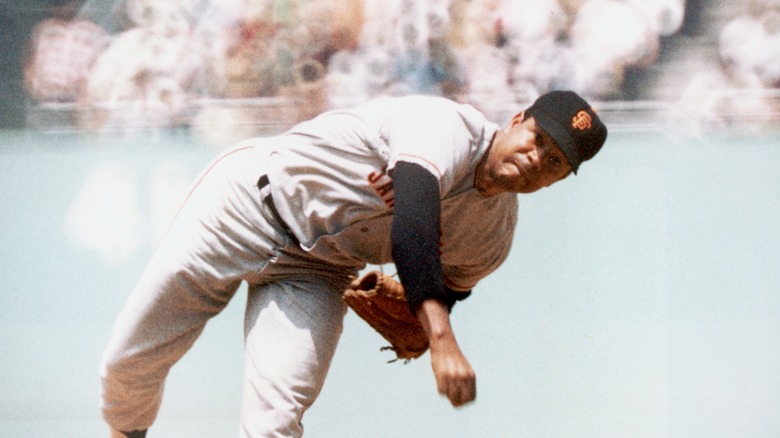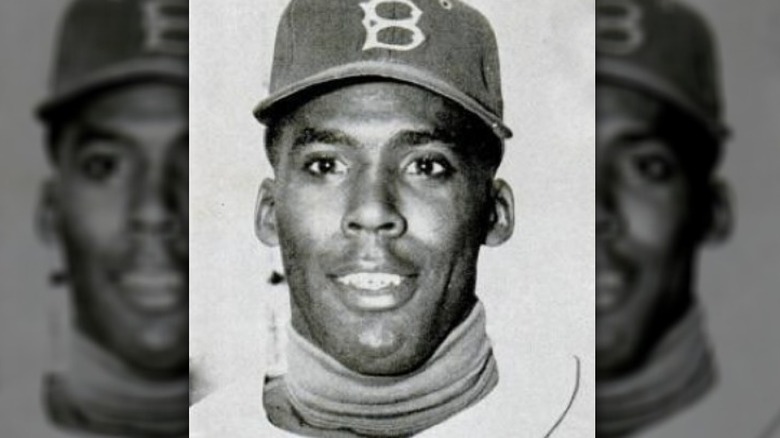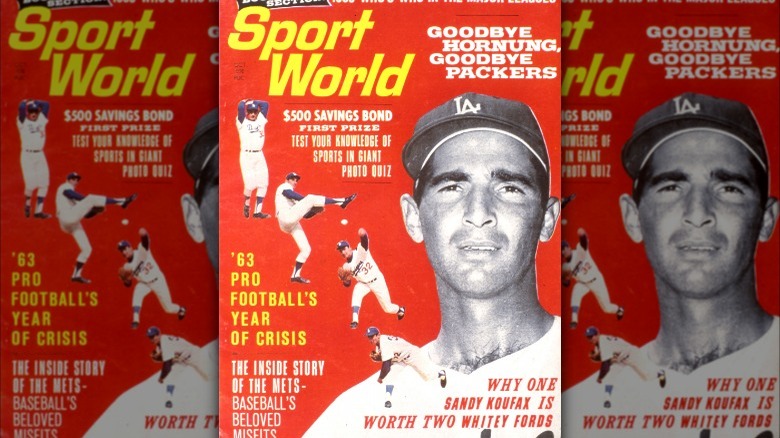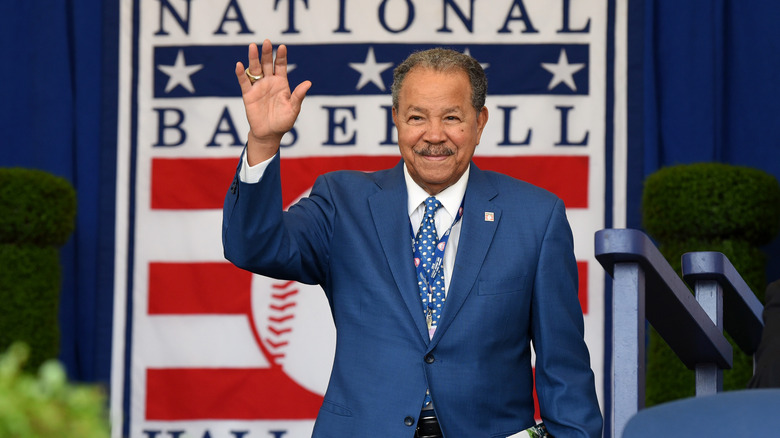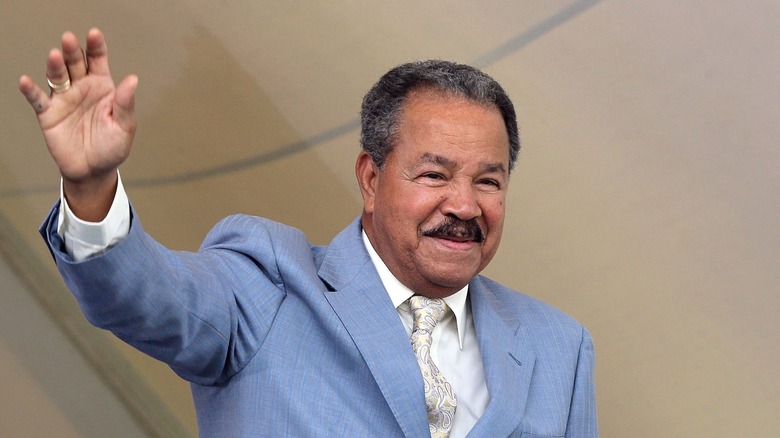Inside The Ugliest Brawl In Major League Baseball History
All sports are inherently competitive, and that spirit of competition can be difficult to control. As ridiculous as it might be for highly-paid adults playing a professional game to engage in violent confrontations, it's certainly not uncommon. From football to hockey, players and even entire teams routinely take things very, very personally and pervert competition into that timeless phenomenon: the brawl.
Baseball is no exception. Although baseball is a slower, more sedate game than hockey, basketball, or football, it's also a sport of deep rivalries that can last decades — and it's had its fair share of legendary brawls. Baseball uniquely combines the individual and the team, which sometimes leads to a personal grudge translating to a brushback pitch or aggressive slide, which can lead directly to entire teams on the field trading blows.
In the long list of baseball brawls, however, one stands out: the August 22, 1965 confrontation between San Francisco Giants pitcher Juan Marichal, a future Hall of Famer, and Los Angeles Dodgers catcher John Roseboro, a well-respected veteran who was Sandy Koufax's preferred catcher. It was a dark moment that involved four future Hall of Fame players who were not normally violent or controversial. What remains shocking about the incident to this day is how sudden and vicious the violence was, and how close it came to being even worse. Here's the inside story of the ugliest brawl in Major League Baseball history.
The stakes were high
One of the most important facts to understand about the confrontation between Juan Marichal and John Roseboro is that the stakes were sky-high for both teams. As noted by Baseball Reference, the Los Angeles Dodgers were in first place with a record of 72-52 going into the game, while the San Francisco Giants were 1.5 games behind them in third place with a record of 68-51. It's important to remember that in 1965 there were no divisions in Major League Baseball — the team that had the best record in the National League would go to the World Series (per Baseball Almanac), so every game between these two teams was crucial for their postseason hopes.
That led to what "The Fight of Their Lives" author John Rosengren describes as a "playoff atmosphere" surrounding the August 22 game. If the Giants won, they would cut the Dodgers' lead to just a half-game, while losing would mean dropping even further behind with just 42 games left to play in the season. As noted by ESPN, the stakes were even higher for both teams because they weren't alone — the Milwaukee Braves were actually in second place, just a half-game behind the Dodgers. That meant that both teams had a lot to lose if they lost the game: The Dodgers would fall out of first place, and the Giants would have a tougher time catching up.
Team tensions had skyrocketed
One key aspect of the brawl that erupted on August 22, 1965, is the fact that the Los Angeles Dodgers and the San Francisco Giants were in the midst of a long and bitter rivalry. As noted by Sportscasting, the Dodgers-Giants rivalry was one of the most famous in baseball history, with a history that stretched back to the very beginnings of baseball in the late 1800s, when both teams were located in New York City. When baseball expanded westward in the 1950s, the Dodgers moved to Los Angeles — and the decision by Giants owner Horace Stoneham to also move to California (per MLB.com) kept the rivalry alive.
According to ESPN, the August 22, 1965, Dodgers-Giants game was the fourth in a four-game series, and the prior three games had already been hard-fought. And according to Baseball Reference, the Dodgers were leading the series 2-1, so if the Giants were going to salvage a split they need to win the fourth game. And as noted by Deadspin, there had already been "testy" incidents in the series — including a verbal argument between Dodgers catcher John Roseboro and Giants pitcher Juan Marichal in game two of the series, after Roseboro complained when Giants outfielder Matty Alou hit his catching glove in a bunt attempt. Roseboro reportedly threatened to have someone throw a ball at Marichal in revenge during that game — which helps explain why Marichal lost it when that's exactly what happened two games later.
Marichal and Roseboro were already stressed
Aside from the traditional rivalry between the Los Angeles Dodgers and the San Francisco Giants, there were additional sources of stress affecting Giants pitcher Juan Marichal and Dodgers catcher John Roseboro. As reported by John Rosengren in "The Fight of Their Lives," a revolution in Marichal's home country of the Dominican (the modern-day Dominican Republic) left Marichal in a state of anxiety over his family. Unable to get reliable news reports, he had no way of knowing whether his relatives were safe.
Meanwhile, Deadspin notes that Roseboro was also a worried man on August 22, 1965, when the two teams met. A week earlier, Los Angeles had been consumed in the Watts Riots. Roseboro, who ESPN reports lived in south central LA at the time, spent an evening standing guard at his house, armed and worried about his own family. He even questioned why Major League Baseball would continue to play scheduled games when his city had suffered a deadly catastrophe.
Another source of stress, according to Rosengren, was the rampant racism both Roseboro and Marichal experienced on an almost daily basis. The author explained to WNYC that Juan Marichal struggled to comprehend the Jim Crow laws still in effect in the southern United States when he began playing baseball, and the Watts Riots prompted John Roseboro to confront the issue more explicitly. There's little doubt all of these stressors combined to make both men more volatile than they might have otherwise been.
The pitchers exchanged a series of brushbacks
As explained by Paul Dickson in "The Dickson Baseball Dictionary," a brushback pitch is used by a pitcher when the batter "crowds" the plate, making the strike zone smaller by inserting their body into it. The pitcher will send a fastball inside, close to the batter, to push them back off the plate as a warning. While the intention is not to actually hit the batter, brushback pitches often lead to confrontations.
Some pitchers are more aggressive, deliberately throwing at batters in order to intimidate or punish them. As noted by ESPN, during the August 22, 1965, game, San Francisco Giants pitcher Juan Marichal knocked Los Angeles Dodgers shortstop Maury Wills down with a hard, inside fastball. Dodgers pitcher Sandy Koufax retaliated in the next inning by throwing over the head of Willie Mays, and Marichal knocked another Dodger down after that, prompting a warning from the umpire in an attempt to stop the escalation.
This did not work. As noted by the San Francisco Chronicle, Dodgers catcher John Roseboro wanted Koufax to throw at Marichal when he came up to bat in the third inning — an extremely dangerous prospect because, as noted by Forbes, Koufax routinely threw a potentially deadly 97 mph fastball. But while Koufax wasn't above a strategic brushback, he was not comfortable with throwing intentionally at batters — Roseboro noted later that Koufax was "constitutionally incapable" of trying to hit someone. So the catcher decided to handle the retaliation himself.
Roseboro escalated things intentionally
According to ESPN, after pitchers Juan Marichal and Sandy Koufax had exchanged a series of "brushback" pitches that sent batters diving out of the way of fastballs, Los Angeles Dodgers catcher John Roseboro knew Koufax wasn't comfortable with such tactics. Roseboro also knew the umpires had warned both teams that ejections would follow if the brushbacks continued, which would cost the Dodgers the services of one of the greatest pitchers of all time (Baseball Reference notes that Koufax would finish the 1965 season with a 26-8 record, a 2.04 ERA, and a then-record 382 strikeouts on his way to winning his second Cy Young Award).
Roseboro reportedly told Koufax he would handle retaliation against Marichal as the Giants pitcher stepped up to the plate in the third inning, according to The New York Times. Watching in the stands, what fans saw was Roseboro dropping a pitch, picking it up as it rolled behind Marichal, and then throwing the pitch back to Koufax — and almost immediately being attacked by Marichal. But Roseboro threw the ball so close to Marichal's head that it actually touched his ear as it sailed past. History reports that Roseboro later admitted he did so intentionally in order to send a message.
Marichal hit Roseboro with his bat and the benches cleared
According to The New York Times, when Dodgers catcher John Roseboro tossed a ball back to pitcher Sandy Koufax in the third inning, he intentionally threw so close to Juan Marichal's head that the ball "nicked" his ear. Marichal turned to confront Roseboro. Deadspin reports that Marichal turned and asked why Roseboro had done that, using a Spanish expletive. Roseboro responded by dropping his mitt and using his own expletive involving Marichal's mother.
Unsurprisingly, this resulted in a brawl. What did surprise people was how the brawl started: As reported by ESPN, when Roseboro — who was a very large man — stepped towards Marichal, the pitcher feared Roseboro would hit him with his catcher's mask. Marichal raised the bat in his hand and brought it down on top of Roseboro's head, opening up a bloody gash and shocking everyone in the stadium. According to History, even the umpires were shocked, with home plate umpire Shag Crawford stating that if Marichal had hit Roseboro with his fists he would not have been ejected from the game.
Unsurprisingly, both teams raced out of their respective dugouts and a full-on brawl ensued. The fight lasted a remarkable 14 minutes with players on each team alternately trading punches and trying to calm things down.
Willie Mays saved the day
As noted by The Washington Post, Hall of Fame baseball legend Willie Mays was one of the most beloved players in history. So it's initially surprising to learn that Mays was in the thick of the brawl sparked by John Roseboro and Juan Marichal on August 22, 1965. But as ESPN points out, Mays was just one of three future Hall of Famers involved in the incident, along with Marichal himself, Willie McCovey, and Sandy Koufax. Mays was one of the first Giants players to get brushed back by Koufax, raising everyone's temperature.
Mays' involvement makes more sense when the San Francisco Chronicle notes that his role in the brawl was to end it, by helping Roseboro — a member of the rival team and the man who'd directly sparked the violence — get the medical attention he needed. John Roseboro was a big man and had trained in boxing and other martial arts. According to Deadspin, he was determined to "annihilate" Marichal if they got into a fight. But as Roseboro tried to get near Marichal, Mays intercepted him, calmed him down, and escorted him away from the fighting. The act defused the situation, and Mays was credited with preventing an ugly brawl from turning into a real tragedy.
Marichal was barely punished, Roseboro sued
Times have changed. According to NBC Sports, Max Scherzer was the highest-paid pitcher (and highest-paid player overall) in Major League Baseball in the most recent season, earning $43 million a year for his services. By contrast, Juan Marichal earned $60,000 in 1965, per Baseball Reference, which would be just over half a million dollars when adjusted for inflation.
This is meaningful because despite attacking John Roseboro with a bat, Juan Marichal's immediate punishment was laughable. According to ESPN, he was ejected from the game (Roseboro left the game because of his injury) and was suspended for eight game days, which translated to 10 games due to double-headers. He was also fined $1,750 (about $16,500 in today's money), which was about 3% of his salary. If Scherzer was fined the same amount, it would be just $1.3 million. Marichal started 33 games in 1964, and 36 in 1965, so his suspension had little impact on his playing time. And the fine didn't make much of a dent in his earnings.
Roseboro sued Marichal for damages, seeking $110,000 — which would have been a little more appropriate considering the fact that Marichal could have seriously injured him with the bat. Roseboro ended up settling the suit for just $7,500.
Race came into it
The bench-clearing brawl between Juan Marichal and John Roseboro happened in 1965, just one year after the passage of the Civil Rights Act, so it's safe to say that racial tensions were pretty high in America. Both Roseboro and Marichal had been dealing with different aspects of racism, according to WNYC, and that stress may have contributed to their short fuses that day. But race played a part in how the brawl was reported and discussed, as well.
As noted by author Douglas K. Lehman in the journal "NINE: A Journal of Baseball History and Culture," racial stereotypes were everywhere in the aftermath of the incident. Roseboro, a Black man whose personality didn't trend towards smiles and cheer, was often seen to be a stereotypically angry Black man, while Marichal, who was Dominican, was perceived as a "hot-blooded" Latino.
As reported by Deadspin, no one even attempted to hide this blatant racism. Sports Illustrated published an article a few weeks before the game that stated "a Latin must be handled more tactfully than his American teammates," and articles written after the brawl used phrases like "young Caribbean hot bloods" which reinforced the heinous idea that non-whites were more violent and less in control.
The brawl hurt Marichal and Koufax's performance
When Juan Marichal hit John Roseboro on the head with his bat, it brought both teams out of their respective dugouts onto the field. A violent, chaotic brawl ensued that lasted 14 minutes, according to ESPN. When order had finally been restored, Marichal found himself ejected from the game for his behavior, and Roseboro was receiving medical attention for the nasty gash on his head.
Everything about the incident was shocking. Los Angeles Dodgers pitcher Sandy Koufax, in particular, seemed very shaken up. Koufax had entered the game with a 21-4 record and a 2.10 ERA, according to Baseball Reference, thanks in part to his control: He would walk just 71 batters in 335.2 innings in 1965, just 1.9 walks per game. But when he went back to work after the brawl, Koufax uncharacteristically walked two batters — and then gave up a 3-run homer to Willie Mays. That ended up being all the Giants needed to win the game 4-3.
Koufax recovered to win 5 of his last 8 games to end his season 26-8 with a 2.04 ERA — and the Cy Young Award. According to Sportscasting, Marichal had a harder time. When his suspension ended and he returned to the mound for the Giants, he went 3-4 the rest of the season. Going into the game his ERA had been 1.73, but it was 3.55 in this final stretch, raising it to 2.13 by the end of the season.
The brawl delayed Marichal's Hall of Fame election
Another side effect of the ugly incident between Juan Marichal and John Roseboro was Marichal's struggle to get into the Baseball Hall of Fame. There's little doubt he had the career stats for the Hall of Fame: According to Baseball Reference, Marichal ended his career with 243 wins, a 2.89 career ERA, and 2,303 strikeouts. More importantly, between 1962 and 1969, Marichal was dominant, winning 172 games (an average of 22 per season).
Marichal became eligible for the Hall of Fame in 1980 but failed to be elected in the first two years. According to ESPN, the reason had everything to do with the brawl — and Marichal knew it. The Los Angeles Times reports that Marichal phoned John Roseboro in 1982 and asked if he would help him get into the Hall. Marichal knew that if the sports writers who vote on Hall of Fame entrants held a grudge against him for his behavior at that game, the only way he would change hearts and minds was with Roseboro's help.
Roseboro agreed to help and flew to the Dominican Republic to play golf at a tournament sponsored by Marichal — a clear signal he had forgiven his former rival. A few months later, Marichal was voted into the Hall of Fame, receiving 83.7% of the vote, well over the 75% threshold required.
Roseboro and Marichal buried the hatchet
Despite the fact that John Roseboro intended to "annihilate" Juan Marichal in their fight on August 22, 1965 (according to Deadspin), and that Marichal literally hit Roseboro in the head with a bat, the two men eventually put their conflict behind them, even becoming extremely close friends.
ESPN reports that the two men met again at an old-timer's game and became friendly with each other. And History notes that when Marichal was shut out of the Hall of Fame because of his part in the brawl, Roseboro helped rehabilitate his image, making it known he had forgiven and forgotten, and even making appearances with Marichal to drive the point home.
The Los Angeles Times notes this was motivated, in part, by guilt. Roseboro had always been seen as an innocent victim in the brawl, with Marichal's attack seen as unprovoked — or at least as an outsized reaction. But Roseboro eventually admitted he'd purposefully thrown near Marichal's head when returning the ball to pitcher Sandy Koufax, and knew he shared an equal amount of blame for what happened.
After helping Marichal get into the Hall of Fame, the two men became very close — so close that when Roseboro passed away in 2002, Marichal was an honorary pallbearer at his funeral and gave an emotional speech saying, "Johnny's forgiving me was one of the best things that happened in my life."
